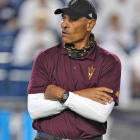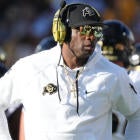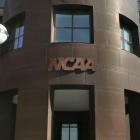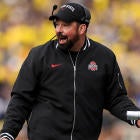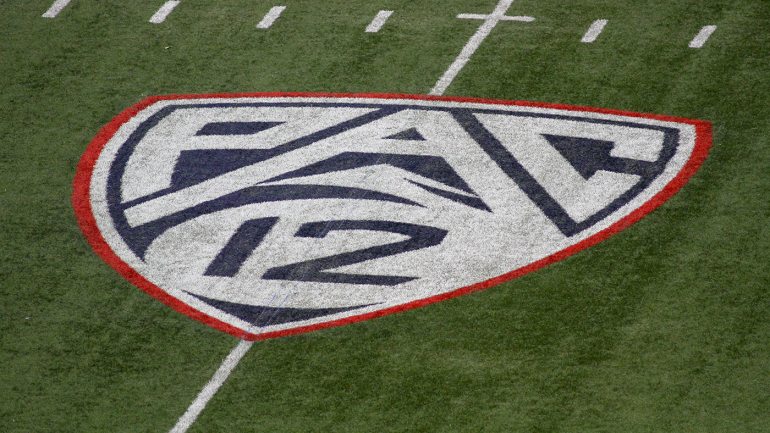
Robert Robbins is a man with an open mind. Arizona's president wants it known that he believes a new TV rights deal acceptable to everyone in the Pac-12 will be completed in a couple of weeks.
"I think it's very high," Robbins said of the prospects of doing that deal. "Let's just say more than 95% confidence limits on this."
But as they in the business world, the entire enterprise is a "soft circle." In other words, there is interest from Pac-12 schools in doing a deal if the money is right.
"A number don't mean anything until it's a written contract," Robbins told CBS Sports. "In Mississippi, they would say, 'They're about to fixin' to give me something.' They haven't quite done it yet. We have to get a real in-writing offer."
Robbins and Big 12 commissioner Brett Yormark have spoken. That's no secret. CBS Sports previously reported Yormark had similar conversations with the other Four Corners schools (Arizona State, Colorado, Utah). And it's obvious Arizona, among others in the league, has options. Robbins calls the Big 12 being in "recruit mode."
The Pac-12 presidents last spoke in person March 7, a meeting in which those TV rights figures were discussed. That all-in number will ultimately determine whether the league stays together or splinters.
It's fair to say there is some level of interest in the Big 12 from those schools, because to this point, a Pac-12 deal has not materialized.
"We could drive to Lubbock," Robbins said of the location of Texas Tech, a Big 12 program. "Texas schools are good for us. Oklahoma State, it's just not that far. It's a two-hour flight."
Robbins has already talked to his peers in the Big 12. Heck, he talks to university CEOs all over the country. That's Robbins: a gregarious, brilliant, analytic, innovative, internationally renowned cardiac surgeon.
In a wide-ranging interview with CBS Sports on Wednesday night, Robbins provided what might be the most inside look at the Pac-12-Big 12 realignment tussle to date.
Robbins said out loud what the industry has been whispering: Fox had a significant hand in luring USC and UCLA to the Big Ten. We learned that Arizona and Arizona State are basically a package deal with Robbins and ASU president Michael Crow in lockstep. If one leaves the conference, the other might follow.
"The value of us, president [Michael] Crow and I, is even though we could go our separate ways, we're pretty locked in with each other," Robbins said. "We don't want to have a Texas-Texas A&M situation where one of us goes to one conference and one of us goes to the other. We're pretty aligned in that regard. If you take us in a bundle, that's a pretty attractive thing."
We also learned that Pac-12 commissioner George Kliavkoff is on the clock with a soft deadline to get a TV deal done. Let's break all of it down.
The magic number
Clearly, the number to beat -- or at least approach -- is $31.6 million. That's average annual amount of revenue each Big 12 team will get when its new media rights deal begins in 2025. Robbins said a gap of $2 million or less isn't going to make a difference. OK, then how much less is Arizona willing to accept before seriously considering the Big 12?
"For a couple of million, I don't see people leaving," Robbins said. "... I think our total will definitely be higher than the Big 12. If I'm wrong about that, is it $5 million [less per year that forces schools to consider leavig], is it $7 million, is it $8 million, is it $10 million?"
Big 12 athletic directors believe their "all-in" number -- including revenue from the College Football Playoff, bowl games and the NCAA Tournament -- will be around $50 million annually in the new deal.
"I still think our number is going to be more than 50," said Robbins.
That might the first time that claim has been made in the Pac-12.
"I know what the Big 12's number is," Robbins added. "I just need to hear what the Pac-12's number is. Then I can make a decision."
Is there a deadline?
Tax day may work just fine for the Pac-12. Asked for a deadline for Kliavkoff to make a deal, Robbins settled on April 15, sort of ...
"Back during the holidays when I was sitting around contemplating life, I said April 15. … I think that is a pretty good time frame for me. Everybody else does not see it that way. They think it should have been yesterday. A couple of weeks from now is certainly better than a month ago."
Is there a conspiracy?
Robbins makes it sound like if the Big 12 can convince one Pac-12 team to bolt, that might lead to a domino effect.
"If somebody were to bolt right now, depending on who it is, it would clearly be destabilizing, which is why the Big 12 is doing it," he said. "If they can get me to say, 'I'm going. I've had enough of this. I love those guys in the Big 12. They're an extension of West Mississippi. They speak my language.' Then I think it would get interesting quickly. If Colorado and us went together, then you've got problems."
Why Arizona and Colorado? The entire Big 12 narrative has been about getting the Four Corners schools (Arizona State, Utah the others). Robbins says Big 12 media consultant Endeavor and its president, Mark Shapiro, have essentially orchestrated what he calls a "great PR campaign" alongside Big 12 commissioner Brett Yormark.
"You got to give it to Endeavor," Robbins said. "I get calls every day, even from my own people in the conference, other presidents [saying], 'Are you really going? Are you going, going?' It's been Colorado and us that they said this about."
He continued: "Mark Shapiro is a very savvy guy. Brett is a good guy. They're in it to win it, I think. They're in recruit mode."
Grant of rights signable?
Robbins was asked if all 10 Pac-12 schools would sign a grant of rights when a new media rights offer is made. That document binds a schools' TV rights to a conference for the length of such a deal. It is essentially a promise ring that means all the parties are going steady.
"If George came back and said, 'This is the absolute best and final thing I'm going to get and it's going to continue to get worse unless we do something,' I think you have to consider, 'What are we doing here?' I don't know what that number is," Robbins said. "… I think we're all locked together and committed to making it work and keeping the 10 of us together. Then, if we get a reasonable enough of deal and we convince everybody to sign the grant of rights, then we can have the discussion, 'Should we go out looking for other people to add?'"
Pac-12 expansion?
OK, so what about San Diego State and SMU? They have long been reported to be expansion candidates for a new Pac-12.
"We've got to have a deal before we think about expansion," Robbins said. "What I would predict, I see the strategy by the Big 12: You can get the Four Corners to go over to the Big 12 and the thing blows up. The Big Ten would be foolish not to scavenge the Oregons and Washingtons that got left behind."
What about Oregon, Washington?
Where exactly do the interests of the Ducks and Huskies stand?
"USC started this whole thing [to move to the Big Ten]. I think UCLA was a reluctant follower in this whole thing. But [USC] needed a travel partner close by so it makes sense," Robbins explained. "If Oregon calls Washington up and says, 'I can double the amount of money you're getting; come with me to the Big Ten,' Washington is going to say, 'OK, I'm in.' They would love to have gone.
"When I heard it first, the deal was going to be USC-Oregon [to the Big Ten]. That makes sense. … Their TV market is not that big, [but] they play in different colored uniforms, and they win. That's where I would have started this thing off.
"I think Fox wanted to consolidate L.A. and not let anybody else in [with USC-UCLA]. I think it's brilliant. Well played."
If the Four Corners stay put but Oregon and Washington ultimately bolt, will the Pac-12 survive with less than 10 teams?
"I've always thought yes. Can someone live without two legs? When you start taking an arm off, it depends on what arm it is," Robbins said.
The wait continues ...
Why is a deal taking so long?
"We're the only one out there. I think the media companies know we're not going anywhere. We gotta have a deal," Robbins said. "Normally, we would just be starting this process, but because the Big 12 jumped out in front, they took $31.6 million -- which is what they were getting with Texas and Oklahoma -- and declared victory."
Editor's note: The $31.6 million figure is actually significantly higher than what the Big 12 was getting with Texas and Oklahoma in its last deal.
Robbins continued: "That then put the pressure on us to start negotiating earlier. I've always said, 'Let's run this thing out. Let's see how many horses we can get in this race.' … I'm not sure anybody else wants to do that. They want to get a deal done and get this behind us so everybody will stop talking about us. I'm not sure that's a good enough reason."
Economic factors creating an issue
The economy continues to struggle, and banks continue to close. This is important to the Pac-12's deal prospects. During its negotiations, Disney (owners of ESPN) and streamers have laid off employees. Robbins is particularly sensitive to the failed Silicon Valley Bank as a former professor at nearby Stanford.
"That's where you went to get your money [for start ups]," Robbins said of the bank. "Now, it's done. Now, they're talking about there's six other banks that could be done. If you're asking me to look [ahead], I think we ought to get the best deal we can get right now, which I think is going to be within the next couple of weeks."
He continued: "There are a lot of tech companies and some of the traditional analog people that have had to lay people off. I think that's part of it. The economy is not good, so maybe we did miss our window. If we waited 90 days, could we get a better deal? But I don't think anybody has the stomach for that."
Does the Big 12 have a leverage play?
If the Pac-12 deal is close to what the Big 12 is getting, would Yormark consider weaponizing the $100 million he will have in the bank from the Texas-Oklahoma buyout as sort of a signing bonus?
"That is a good asset for them to make deals with," Robbins admitted.
How does academics factor?
What influence does the Pac-12 elite academic reputation have on Arizona's decision? Nine of the 12 current Pac-12 schools are members of the American Association of Universities -- top Tier I research schools. Kansas will be the only AAU school in the Big 12 once Texas leaves.
"That's a big deal," Robbins said. "It's a big deal to the Big Ten, and it's a big deal to us. But at the end of the day, this thing is getting unwieldy. The Big 12 has one AAU, Kansas. When I tried to take it back to the other presidents, that's something we talked about. But it's really about TV markets and how much media companies value your brand."
Too much streaming?
Robbins was asked what concerns persist about large parts of Pac-12 games being shown on a streaming partner rather than linear television. A large streaming presence would almost certainly mean problems regarding visibility and subsequently recruiting. CBS Sports has reported that more than 50% of Pac-12 football games could be exclusive to streaming.
Robbins said he has never heard that discussion within the conference. "No way. ... [You hear talk of] it's going to be all streaming. Nobody is going for that. Over 50%? No, I don't think so. I think that's too much. It's OK if it's 50-50. … You have to remember, guys our age, people that I went to high school with aren't going to want to deal with streaming.
"I don't think it will be more than 50%, but if it ended up 50%, I think it would be OK. But we are West Coast and we have to recruit the whole nation. If the football coaches come back and say, 'Are you out of your mind?' We're the final decision makers without a question, but we're going to heavily consult our ADs and coaches and all that stuff."
The gap
No matter what happens with a Pac-12 deal, the SEC and Big Ten will be at least $30 million annually ahead of everyone else on a per-school basis. That gulf is significant and will be difficult to overcome.
"That's a big number. I've never tried in my life to win third place for anything. If we get a solid bronze medal in this thing, it's the best we can do for right now. Most people have us dead. They have us completely ... it's like an airplane crashing … into the bay into a 1,000 pieces. I still think we're going to get a solid bronze medal in this thing."
What are the implications, though, of that difference?
"Woof, talk about money for facilities, coaching salaries, support of student-athletes, mental health, academic success, nutrition, training facilities, anything you want to talk about. They're going to clearly be better than us. But they already are."















